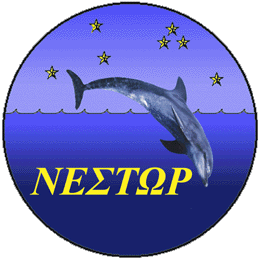 |
 |
 |
The 2002 European School of High-Energy Physics (formerly the CERN-JINR School of Physics) will be organized jointly by the European Organization for Nuclear Research (CERN), Geneva, Switzerland, and the Joint Institute for Nuclear Research (JINR), Dubna, Russia, together with the NESTOR Institute for Deep Sea Research, Technology, and Neutrino Astroparticle Physics, Pylos, Greece. The basic aim of the School is to teach various aspects of high-energy physics, but especially theoretical physics, to young experimental physicists, mainly from the Member States of CERN and of JINR.
The Schools of Physics are designed to give a survey of
up-to-date information, rather than to be a training course. Reading lists
and an outline of each of the lecture courses will be sent to the selected
students in late Spring 2002 together with their letters of acceptance.
The tenth European School of High-Energy Physics will be hosted by the NESTOR Institute in Pylos, Greece, from Sunday 25th August to Saturday 7th September 2002.
The picturesque and historic town of Pylos lies on the beautiful bay of Navarino, in the south-west Peloponnese. The popularity of Pylos comes not only from the many attractions of the present-day town and its port, but also from its important role in Greek history over the last four millennia. The ruins of the palace of King Nestor, the wise sage of the Greeks in Troy, look down on the town of Pylos where the tablets of the linear-b, the oldest Greek alphabet, were deciphered. Pylos and the island of Sphacteria were also the scene of one of the most important battles of the Peloponnesian war: it was at the naval battle in the bay of Navarino, in 1827 that the independence of the modern Greek state was sealed.
The town is located 280km SW of Athens (3.5 hours drive),
and 41 km from Kalamata International Airport.
Students participating in the School will share accommodation in the Hotels in Pylos which are all located within easy walking distance of the water front. Lectures will be held in the 12th century Castle of Niokastro and in the adjacent NESTOR Institute.
In addition to free time in the afternoons, School excursions are planned to include visits to Olympia and Messina.
Free time activities in the area include hiking, swimming, snorkelling and spear-fishing.
It is also hoped that scuba diving, sailing and windsurfing
lessons can be offered (at cost) and certification will be possible
The preliminary scientific programme is as follows:
| Basic Cosmology | A. Cohen (Boston University) |
| Neutrino Physics | A. De Rújùla (CERN) |
| QCD Phenomenology | Y. Dokshitzer (Université Paris VI) |
| Concepts of Heavy-Ion Physics | U. Heinz (Ohio State University) |
| Introduction to Physics beyond the Standard Model | J. Iliopoulos (Ecole Normale Supérieure,Paris) |
| Standard Model & Introduction to Field Theory | C. Quigg (Fermilab) |
| Flavour Physics | H. Quinn (SLAC) |
| Instrumentation | S. Stapnes (University of Oslo) |
Discussion sessions, which are intended to clarify points which may be obscure from the lectures, will be held most afternoons and will last about 75 minutes.
The discussion sessions will be led by:
The working language of the School will be English. Participants
should therefore have a good understanding of English to enable them to
benefit from the School.
The School Proceedings will be published as a CERN Yellow Report in the spring of 2003. Each participant will receive one copy free of charge.
The Proceedings from the 2001 School, which took place
in Beatenberg, Switzerland will be published in the spring of 2002.
Students should arrange to arrive at the NESTOR Institute in Pylos for registration during the afternoon or evening of Sunday 25th August. The School will end on the morning of Saturday 7th September after breakfast.
The nearest international airports are in Athens (280km/ 3.5 hours drive) and Kalamata International Airport (41 km).
Further details of transport will be given in the second
Bulletin.
The cost of the School will be approximately 1,600 Swiss Francs per student, and will cover tuition, full board and lodging in Pylos from dinner on Sunday 25th August to breakfast on Saturday 7th September 2002, as well as coffee, tea or cold drinks during the morning and afternoon breaks, and some social activities. It does not include travel expenses from participants' home institutes to Pylos and back.
For participants from JINR and its Member States there are special arrangements for paying the School Fee and for travel. For further information please contact the JINR Organizing Secretary, Tatyana Donskova (see Enquires and Correspondence below).
INTAS (the International Association for the Promotion of Co-operation with Scientists from the Independent States of the former Soviet Union) provides funds for students working in the former Soviet Union countries. They are: Armenia, Azerbaijan, Belarus, Georgia, Kazakhstan, Kyrgyzstan, Moldova, Russia, Tajikistan, Turkmenistan, Ukraine, Uzbekistan. The Organizing Committee expects that other sponsorship will also be available to provide funds for students from both eastern/central European and developing countries. Students from these countries are therefore encouraged to apply even if they do not have local financial support. It is also hoped to be possible to obtain additional support from other sources such as UNESCO.
Details concerning the method of payment of the Fee will
be included in successful applicants' letters of acceptance and published
in the second Bulletin.
The School is open to young physicists preparing a PhD
or equivalent in high-energy physics, with at least one year's experience
working as an experimentalist. The number of students will be about 100,
mostly from the CERN and the JINR Member States, although the School is
also open to those from other countries. Personal contacts and informal
discussions among the participants during leisure time are an important
aspect of the School. For this reason, participants are asked to note that
they should not be accompanied by family members or friends.
Applications to attend the School should include:
- a completed application form
- a 100-word summary of current work
- a letter of reference and ranking from the candidate's professor or supervisor.
The Application Form for the 2002 European School of High-Energy Physics should be completed and sent as soon as possible and no later than the closing date of 23rd March.
The submission of the completed application form must be accompanied in parallel by a letter of reference and ranking from the student's professor or supervisor (hard copy on headed paper, signed and dated), without which applications will not be considered. The professor or supervisor's name and the date of the reference letter should be indicated in the appropriate boxes on the Web application form; and the letter should be sent to Danielle Métral, the CERN Organizing Secretary (see Enquiries and Correspondence below).
Students who wish to apply but who do not have a suitable browser for the Web application form should request a hard copy of the form from one of the Organizing Secretaries (see Enquiries and Correspondence), stating clearly their name and postal address. Their 100-word summary of current work should be sent by electronic mail to the CERN Organizing Secretary.
Candidates should ensure that their application, letter of reference and 100-word summary reach the CERN Organizing Secretary by Saturday, 23rd March 2002.
The selection of the students will be made by the Organizing
Committee, and all applicants will be informed in April 2002 whether or
not their application has been successful.
All enquiries and correspondence related to the School of Physics should be addressed either to:
| Danielle Métral
School of Physics CERN/DSU CH-1211 GENEVA 23 Switzerland |
Tatyana Donskova
International Department Joint Institute for Nuclear Research RU-141980 Dubna, Moscow Region Russia |